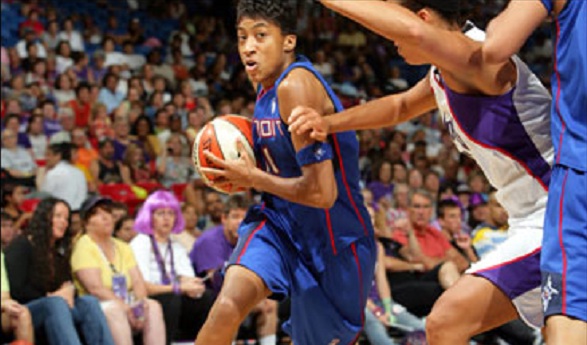
Right Where She’s Always Been
January 3, 2013
By Rob Kaminski
MHSAA benchmarks editor
It was between seasons for WNBA player Stacey Thomas. She sat in her Northwestern University basketball office, where she worked as the Wildcats' director of basketball operations, and listened to a message that she’d heard somewhere before.
“It was before a game in 2004, when an official for that night’s game – Marvin Sykes – stopped into my office and was chatting up officiating,” Thomas recalls. “He gave me recommendations for different associations, and various contacts, and that's when I actually registered and started reading rules books and studying mechanics.”
Suffice to say, basketball was her life. From her days as a prep standout at Flint Southwestern to a brilliant career at the University of Michigan, and ultimately to the sport’s pinnacle with a six-year career in the WNBA, Stacey Thomas had achieved hoops success beyond her wildest dreams.
Yet, it was two instances off the court – mere blips among the thousands of chance meetings and casual introductions in one’s lifetime – which steered Thomas where she is today. Ironically, it’s still on the basketball court.
The conversation with Sykes was the second moment, and it struck a familiar chord with a message she had heard years earlier as a collegiate player in Ann Arbor.
“The first time I ever thought about officiating was when I was playing at the University of Michigan. A little bug was put in my ear during the preseason when officials come in to talk about officiating, the rules changes, how the game is going to be called; that sort of thing,” Thomas recalls. “It was Patty Broderick (professional and collegiate official who currently serves as Coordinator for the Women's Basketball Officiating Consortium). And at end of that talk she told us how officiating could be a great career and a way to stay in the game.”
In the short term, however, Thomas had other ways to stay in the game. You could even say, she stole her way into extending her playing career. As a Wolverine, Thomas set a Big Ten Conference record with 372 career steals, 157 more than any player in U of M history. Her 1,556 points rank fifth in the Wolverine books.
Those numbers and her work ethic led to six seasons in the WNBA, highlighted by a championship with the 2003 Detroit Shock. Thomas played 175 games over six seasons with four teams. And, when her days in “The League” were done, Thomas’ skills took her overseas to stints in Sweden, Turkey and Latvia over three years.
All the while, however, Thomas had her sights set further down the road, for when the game stopped. As it turns out, it hasn’t stopped at all.
“As the years went by and I decided I was done playing, I thought about what I really wanted to do. I knew I wanted to stay in basketball,” Thomas said. “I was an assistant coach at Central Connecticut State in 2004; it was a good experience, but I liked the administrative job at Northwestern better.”
And, of course, there was always that officiating thing she’d heard about.
“While I was looking, I thought maybe I needed to really explore the officiating option,” Thomas said, and she now enters her sixth year as an MHSAA registered basketball official. “As involved as I was with basketball, it gave me the opportunity to stay in the game and be surrounded by the game. It’s a source of pride, and for me it’s the ongoing concept of getting it right and always striving to be better. I want to be professional, set goals and be the best official I can be.”
In other words, she approached officiating in the same manner she attacked opponents on the basketball floor. It’s still the game she’s known her whole life, just from a different perspective.
“As a player, I was around a lot of different coaches and a lot of different teammates, and they all have their own personalities. Understanding that really helped in the transition to officiating,” Thomas said. “You learn to pick your battles and to take things in stride. You can't take things personally. Some coaches try to rattle you by being vocal and boisterous, and others are sarcastic and joking. As a player or as an official you have to read personalities. Playing the game helped me learn how to react, speak to them, and communicate.”
At times, her fame comes into play as well. It’s not easy to hide when officiating in the same state where Thomas’ star began to rise, and coaches often remind her that she used to be on the floor reacting to, rather than blowing, the whistle.
“I am a very laid-back individual, and it takes a lot for me to get rattled, so I use that to my advantage. I might hear from certain coaches, ‘Come on, you played in The League; they didn't call that in The League,’” she laughs. “I just take it for what it is, whether they are trying to get under my skin, or be humorous. I know as an official to just let them have their say.”
The former prep all-stater who finished second in Michigan’s “Miss Basketball” voting as a senior in 1995, also was a three-time high jump champion and ran cross country at Southwestern. She hasn’t totally left track and field behind either, as she is a registered track & field/cross country official with the MHSAA as well.
Thomas, who now resides in Novi, regularly works boys and girls high school basketball in the Metro Detroit Area, and runs on Michigan’s community college circuit and at the NAIA level in the Wolverine-Hoosier Athletic Conference. The competitive fire that drove her as a player transfers to her uniform in stripes, as she eventually hopes to land NCAA Division I assignments.
“My playing experience helped me learn that you’ve got to pay your dues. You’ve got to work hard and have patience,” Thomas said. “I know that there are plays I have to still see over and over and over, so I will get them right on a consistent basis. I need to get to the camps, continue to learn the rules book, and my time will come. The more games, the more reps, the more situations, the more you learn.”
It’s a quality and regimen she tries to impress upon up-and-coming officials, and she also expresses that it’s important the many benefits of officiating aren’t lost in the quest for top games.
“I’ve developed so many friendships and made so many friends by getting into officiating. What better way to have an impact on a sport?” Thomas asks. “I tell people to have fun, enjoy it and work hard. Most of all, I always tell them being compensated is a bonus for doing something you love to do.
“Sometimes the younger officials get too caught up in what other officials are doing,” she continued. “Who’s got the big games, the pay rates, and so on. I played in The League, and I knew going in I wouldn't just come in and have the best games. You’ve got to put the time in.”
Thomas has noticed impatience not only among young officials, but in the playing ranks as well.
“On certain levels, the speed and physical nature of the game has increased,” she said. “There’s all this talent, but at the same time the players have become a little bit lazier compared to back in the day. Years ago, kids had more passion for the game, because nothing was given to them. They were better listeners to coaches, peers and parents.”
When Thomas shares the floor with today’s high schoolers, they are definitely getting her best effort and maximum attention. She understands what’s at stake, and what the high school game is all about. It’s why she accepts games nearly every night of the week during the season, and why she relishes those weeknights in the gyms.
“First of all, it's a special time in their lives, and it’s their turn to shine and to play at a high level and to be seen by their classmates and by the community,” Thomas says. “There’s nothing like that seven o’clock rivalry game, with a big crowd packing the gym, and it’s a close game and you are right there in the fire. It’s an adrenaline rush that pumps you up. Those are the games you strive for.”
Thomas has been on the floor for plenty of those games, and will have countless more in the future. That’s what makes it most special to know where she was this June when she could have been elsewhere. Thomas spent some time at the Healthy Kids Club in Detroit, helping director Mariah Lowson with basketball leagues for kids who ranged from 8 years old to high school age. Officials paid $20 to attend the camp and gain experience that will help them down the road. It certainly doesn’t hurt to see someone there like Thomas helping out.
“The nice thing is, it’s younger kids in the league, so young officials would not be intimidated,” Thomas said. “The motivation for them is to do well in these games, understanding that they can make money doing peewee leagues while continuing to learn. There were some kids as young as 13 or 14 years old, up to 17 years old, working games.”
And there was Thomas, right on the court as she’s always been.
PHOTO: Stacey Thomas drives to the basket as a member of the WNBA's Detroit Shock.
NOTE: This is the seventh installment in the series "Making – and Answering – the Call" detailing the careers and service of MHSAA officials. Click the links below to view others or the blue "Officials" tag at the top of the this story for the entire series plus other Second Half coverage on the subject.
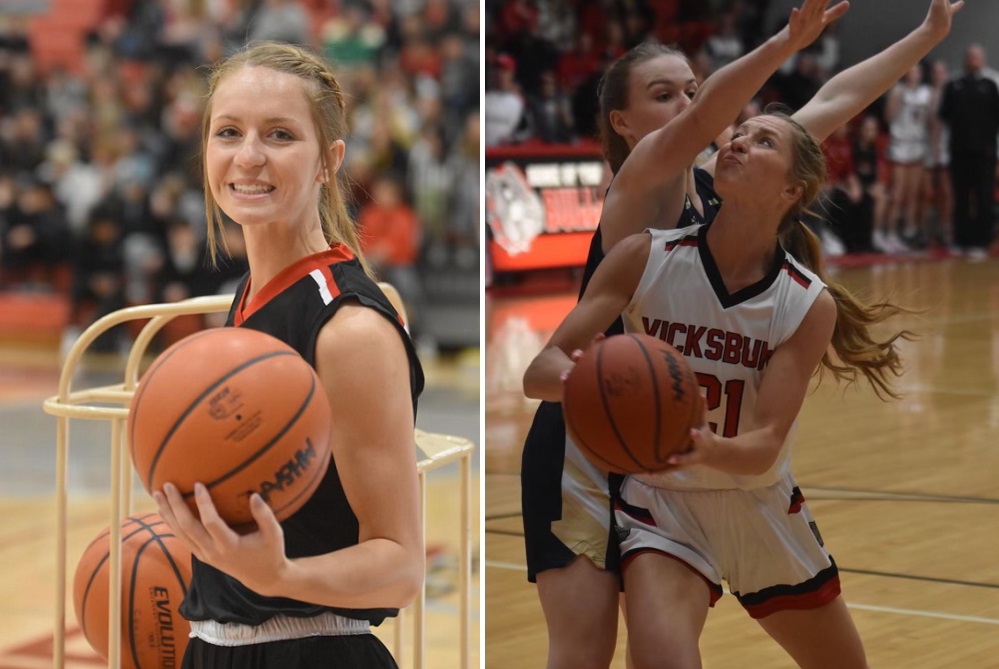
Fearful Start Behind Her, Abnet Continuing to Amaze for Undefeated Vicksburg
By
Pam Shebest
Special for MHSAA.com
February 7, 2023
VICKSBURG – It is not often that a mother calls her child’s concussion a blessing, but it certainly was for Vicksburg senior Tristin Abnet.
 The concussion, sustained her freshman year during a volleyball game, led to tests which led to the discovery of a brain tumor.
The concussion, sustained her freshman year during a volleyball game, led to tests which led to the discovery of a brain tumor.
Luckily, the tumor was benign and, after the surgery and a long recovery, Abnet is one of two seniors on the undefeated girls basketball team that has set a program record this winter for most wins in a season at 16 and counting, eclipsing the previous mark of 15.
And when it comes to Abnet’s journey over the last three years, Bulldogs coach Tim Kirby said it’s been nothing short of amazing.
After taking a hit during a volleyball game, “I actually got a concussion and I ended up with a headache for about a month or so,” Abnet said.
“I didn’t think too much of it because I always got injuries and always got over them. But this one scared me a little bit.”
It was not until she was playing in a college exposure softball tournament that November that she realized something more was going on.
“Tristin was an up-and-coming softball athlete throughout the country,” her dad, Cheyenne, said. “She won many national championships up to her freshman year (in travel softball).
“We were playing at a college exposure tournament, and she was the youngest on the team. The third day (of the tournament) she started crying because her headache was so bad. She asked me if I would take her out.”
Her mother, Kristina, added, “That was so unlike T. She would battle through anything.”
At that moment, they knew something was terribly wrong.
“She was only making it through maybe two days of school every week because of headaches,” Kristina said. “We took her to her family doctor (in November), and they weren’t comfortable with everything.
“Her doctor (Rosa Maira) said she felt it necessary to do further imaging. Had she not, we’d still never know.”
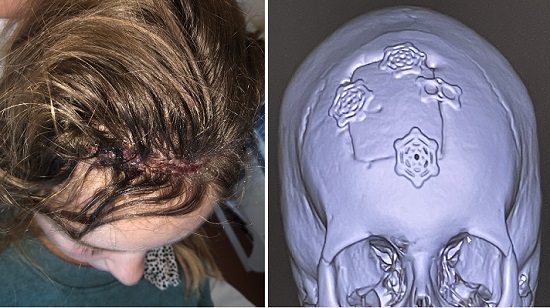 The wait during the imaging dragged on, causing a bit of concern for her parents.
The wait during the imaging dragged on, causing a bit of concern for her parents.
“They kept her for so long, and I said there’s something wrong – Mother’s intuition,” Kristina said.
“Then they came out and took us back and showed us what they found and asked to do further testing. Everything snowballed after that.”
Finding out about the tumor, “My world crashed,” Kristina said, with tears in her eyes. “(In 2011) I had a lot of tumors, desmoid tumors, and to think of the battle I went through and the fact that it was on her brain, it was tough.”
In March, doctors performed a biopsy, finding Tristin’s tumor was a low-grade glioma, which is benign.
“We all lost it that day,” Kristina said. “We had our entire family there for her first surgery in March. We left (the hospital) three days later, and then COVID hit.”
With classes online, “She ended up not having to go back to school that year, so that was a blessing too.”
The surgery to remove the tumor was scheduled for August 2020, and during the months between the biopsy and surgery, Tristin said, “I didn’t want to freak myself out because I knew it was coming, I knew what was going to happen and there was nothing I could do about it.”
Her dad said Tristin “never cried in front of me from the day at the tournament all the way to the day of her surgery.
“She was so, so strong, and she was just a little girl. I never saw a tear until they were ready to wheel her away for the surgery.”
One worry for Tristin was the chance of losing her hair to facilitate the craniotomy.
“First they told me they were going to shave my head halfway back and then, as I was getting wheeled back, there were two girl nurses talking about what they were going to do with my hair, so I knew they weren’t going to completely shave my head,” Abnet said.
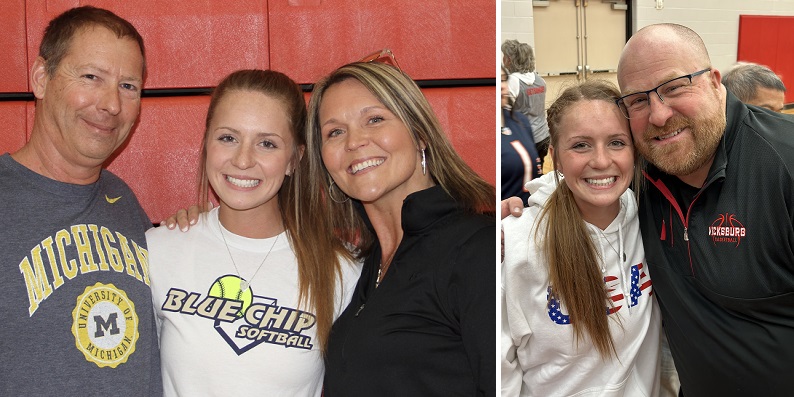 The surgery lasted 13 hours at Helen DeVos Children’s Hospital in Grand Rapids, and three days later she was headed home to her bedroom decorated by friends and family.
The surgery lasted 13 hours at Helen DeVos Children’s Hospital in Grand Rapids, and three days later she was headed home to her bedroom decorated by friends and family.
At first, Tristin was allowed no competition for six months after the surgery. But after a CT scan, doctors added another two months before giving her the OK to play.
“There are (three) metal plates there, that’s why she could not go back to sports for such a long time because that plate had to heal,” her dad said.
Although she could not play basketball her sophomore year, she found a way to stay involved: She became the varsity team manager.
“As a sophomore she literally was here for every practice and every game, even though she wasn’t allowed to participate,” Kirby said.
“At the end of the season, her team unanimously voted her “best teammate” on the entire team, and she couldn’t play. I think that’s a testament to the kind of person she is and the impact she had on the team.”
After taking a year off and after major surgery, Abnet had a lot of catching up to do, both physically and mentally, during her junior year, her coach said.
“Last year, you just wanted to make sure you kept her safe,” Kirby noted. “This year, I haven’t worried about it as much because she’s been through it and we’re all more comfortable with it.
“She knows what her limitations are. Last year, I was a little more leery about it.”
Tristin worked her way back into shape.
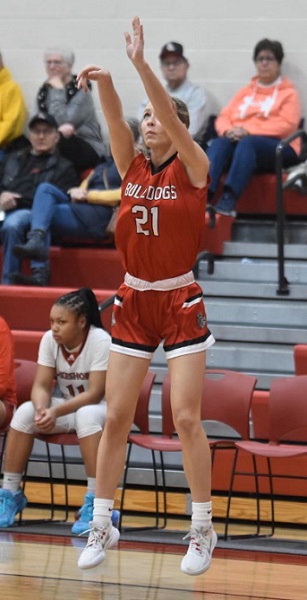 “She goes to the gym four days a week,” her mom said. “She’s literally built up about 10 pounds of muscle.
“She goes to the gym four days a week,” her mom said. “She’s literally built up about 10 pounds of muscle.
“She lost 35 pounds after her brain surgery. She went from being a fit athlete to being very tiny, very fragile.”
Those first few games back last year were also nail-biters.
“I was absolutely terrified,” her mom said. “One hit to her head and her forehead could concave.”
They were a bit daunting for Tristin as well.
“I was super, super nervous because I didn’t want to get hit in the head and have to go through that surgery again,” she said.
Her dad added that the surgery changed her.
“She’s not the athlete she was four years ago; she’s not, and that’s fine,” Cheyenne said. “It took me a while as Dad, as (softball) coach, to understand that. I’m proud of her.”
Through it all, she never let her grades suffer and carries a 4.13 GPA.
She is also called the team “mom,” taking snacks to road games and putting out reminders every day in the team’s group chat.
“She inspires me every single day,” Kirby said. “When you’re a young team, you have to have that leadership. She’s a great leader for us. She bonds everybody together.”
That bonding is one thing that is so special about the Bulldogs, Kirby said.
“They work hard every day and they share the basketball like nobody I’ve ever seen before,” he explained. “Every night, someone else leads us in scoring.
“I’ve had seven different girls lead us in scoring this year, and I don’t have anyone averaging 10 points a game right now.”
Amanda Laugher joins Abnet as the team’s seniors. The young roster also includes juniors Brooklynn Ringler, Emma Steele and Maddison Diekman and sophomores Scarlett Hosner, Kendra Cooley, Emily Zemitans, Makayla Allen and Hannah Devries.
As for the school record, that was not the team’s goal at the beginning of the season.
“Our goal this year is to win the (Wolverine) Conference championship,” Kirby said. “Vicksburg has never won a conference championship in girls basketball. That was our No. 1 goal this year.
“We host our District this year, so we’re hoping maybe to follow up a conference championship with a District championship. You get to that point, and it’s all gravy.”
 Pam Shebest served as a sportswriter at the Kalamazoo Gazette from 1985-2009 after 11 years part-time with the Gazette while teaching French and English at White Pigeon High School. She can be reached at [email protected] with story ideas for Calhoun, Kalamazoo and Van Buren counties.
Pam Shebest served as a sportswriter at the Kalamazoo Gazette from 1985-2009 after 11 years part-time with the Gazette while teaching French and English at White Pigeon High School. She can be reached at [email protected] with story ideas for Calhoun, Kalamazoo and Van Buren counties.
PHOTOS (Top) Vicksburg’s Tristin Abnet is glad to be back on the court, and intense going to the basket. (2) Stitches stretched across Abnet’s scalp as three metal plates and a hinge were applied to her skull. (3) Abnet is surrounded by support including parents Cheyenne, left, and Kristina, and coach Tim Kirby. (4) Abnet launches a jumper during a game with Stevensville Lakeshore. (Photos courtesy of the Abnet family.)

